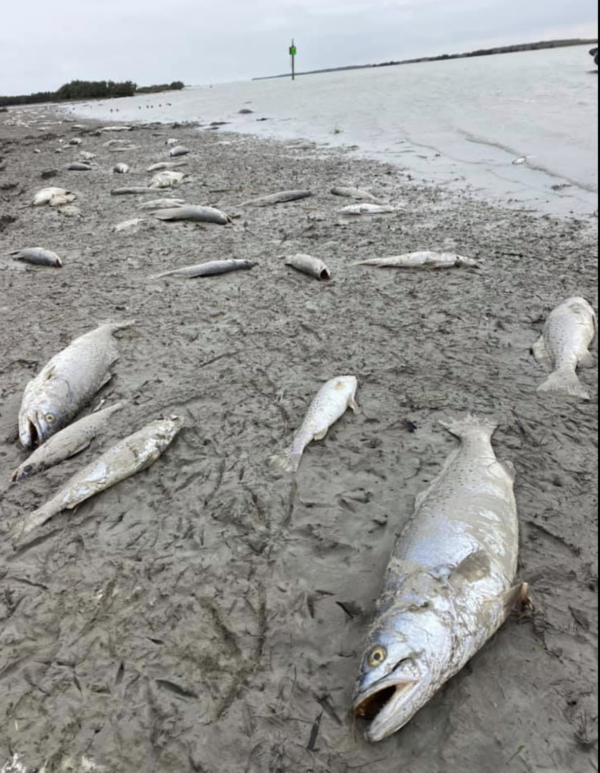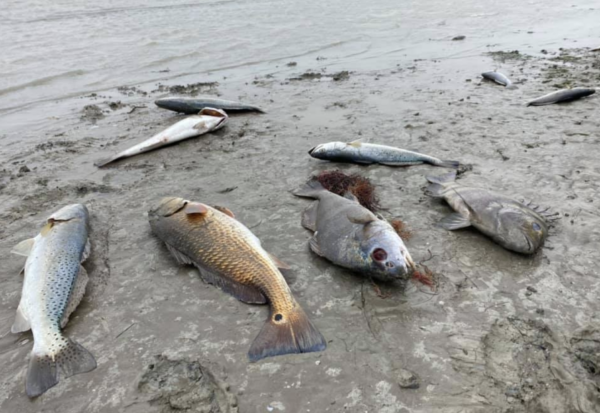
Texas is many things—but prepared for severe winter storms is not necessarily one of them. It’s not just the infrastructure or the folks, some critters aren’t really equipped for the cold either. To be fair, the Lone Star State hasn’t seen a storm of this magnitude since the ’80s, so why should they be?
According to Texas Saltwater Fishing Magazine, the ’83 freeze left about 14 million fish dead, and ’89 saw two deep freeze events, resulting in an estimated 11 million dead fish. Will the storm of ’21 be as detrimental? It’s difficult to tell at the moment.
Captain Caleb McCumber recently took his boat out in the Matagorda Bay area. “I want to convey the idea that everybody shouldn’t be running around in their boats right now,” McCumber said on the Bite Me Podcast. The group took extreme caution on their scouting mission, trying to stay out of areas where they thought fish might be. Using a drone they could see shallow areas that were completely frozen over with some massive ice formations on the water.
Matagorda is a pretty shallow bay; the deepest spot is only about 6 feet. Around the bay they saw dead snook, sand seatrout, speckled seatrout, sheepshead, croaker, ribbon fish, other baitfish, sea turtles, and sea birds. However, the animals that are visible are only a portion of the deceased, as the majority of the dead fish are stuck on the bottom for now.

As a tournament fisherman, McCumber could see new restrictions coming forth in the future: “If they drop the limit to zero and outlaw tournaments for a year or two, I’ll embrace it. Whatever it takes to get our populations back.”
Captain Scott Null of Port O’ Connor witnessed the ’80s freezes and is trying to remain optimistic about the current situation in Texas. “I’m not a downer kind of guy, but I knew we were in trouble…I didn’t know it was going to be quite this much trouble,” he told host John Lopez of the Bite Me Podcast.
Null’s rule of thumb for fish-freeze die-offs is “45 degrees for 24 hours, that’s the killing point.” Realistically, different species have varying tolerances for cold water, but this is a generic, fisherman’s rule. On Feb. 16, one captain threw out a weighted line with a thermometer into deeper water and it read 34 degrees. Still, Null remains hopeful that some fish were able to get to safety because the water cooled slowly.
In efforts to protect the species that found refuge in warmer waters, Texas Parks and Wildlife has closed fishing in certain areas on the Gulf. This is common practice when temperatures on shore drop below 32 degrees. According to a press release, “in addition to killing game fish in shallow bay waters, a hard freeze can also cause surviving fish to congregate in a few deeper areas where they become sluggish and prone to capture. Those are the areas the department has temporarily closed.”
Null pointed out that if you are any sort of gulf fisherman, you know other places the fish have moved to. If so, it’s likely a “shooting fish in a barrel” type scenario because they are so stressed and pressured to be in those specific areas for survival.
“There’s times when you should just do the right thing. And the right thing right now is to be a lot more conservative and not put a bunch of fish in your freezer,” Null said. “We need those fish out there to breed.”

TPW has also been busy rescuing cold-stunned sea turtles. You might believe that nature should run its course, and it seems strange to save that one species in particular, but sea turtles are listed under the Endangered Species Act. They are also extremely vulnerable at the moment. “You could put a cold-stunned turtle in a half-inch of water and they’d drown,” Wendy Knight, executive director of Sea Turtle Inc., told the New York Times.
Looking towards the future, Captain Dean Thomas told Bite Me that he expects folks to be back out fishing rather soon. “Any fish caught is going to be a blessing in the next few months, don’t be discouraged, just be realistic about your expectations for a while.”
Captain Jeff Larson managed to see some light in the situation as well, pointing out that the freeze “gives me a great excuse if I have a bad day of fishing.”
Although this mass die-off is sure to have some lasting effects on the gulf ecosystem, Texans seem confident it will rebound. In the meantime, give the fish a little time to recover and stay warm, Texas!
Catch more fish news on MeatEater’s Bent Podcast with hosts Miles Nolte and Joe Cermele. Don’t forget to subscribe!






